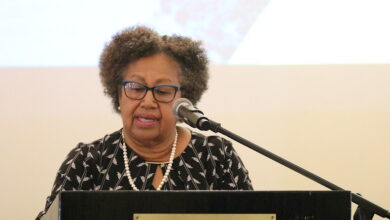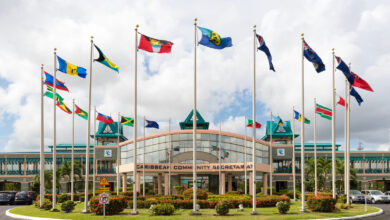Today, Saturday, 1 December 2001, the entire world finds itself in the vice-like grip of the most devastating disease ever recorded in the long and enduring history of mankind. Since the first clinical evidence of the Acquired Immunodeficiency Syndrome (AIDS) was reported twenty years ago, an unprecedented 60 million people worldwide have become infected with the deadly virus. At this very juncture, an estimated 40 million people from every place on planet earth, every ethnic origin, every religious culture, and every stratum of society are living with HIV/AIDS. And the projection is that this year alone, more than 3 million people across the globe will succumb to its fatal effects. Undoubtedly, it is a human tragedy of unprecedented proportions.
The Caribbean region has not been spared the wrath of this insidious and crushing human catastrophe. Indeed, the Caribbean now has the dubious distinction of being ranked as the second worst affected region in the world, with adult HIV prevalence rates, exceeded only by those of sub-Saharan Africa. Gloomier still, is the recent report from the Caribbean Epidemiology Centre (CAREC) that warns that the epidemic in the region is likely to escalate even further in the immediate future, since it is yet to reach its peak in most of our countries.
Indeed, it is perhaps instructive for us to remind ourselves of some of the chilling statistics which characterize this epidemic in the Caribbean region, excluding Cuba.
- Between 2 and 4 % of adults in the most productive age group of 15 – 44 years are estimated to be living with HIV infection. This translates into between 400,000 and 500,000 persons who are infected.
- Further, in the year 2000 alone, an estimated 57,000 adults and children became infected with the disease.
- The number of cases of HIV infection in the Caribbean that have converted to AIDS almost tripled during the last decade, with an unmistakable upward spiral in the incidence showing on all the radar screens.
- And perhaps the most painful of all is the grim reality that every day about three infants in the region are condemned to HIV infection by way of the mother-to-child transmission route, thereby severely compromising their chances of survival.
But if these health statistics can be viewed as stark, the economic consequences of this disease are no less so. The University of the West Indies has projected that the economic burden of the disease calculated in terms of loss of productivity hovers around 5% of the region’s Gross Domestic Product (GDP) annually. This projection does not include the estimated cost of care and treatment of infected persons which will require in the order of between US$260 million and US$600 million annually.
This is the unhappy context in which today we celebrate World Aids Day 2001. The theme that has been chosen is “I care, Do You?” The aim is not only to focus continuing attention on the prevention and control of the epidemic, but also to engender a universal spirit of compassion and support for those affected by the bruising effects of social stigmatization and discrimination which sadly still accompanies this disease.
HIV infection knows no boundaries and no sexually active person is truly beyond its reach. It is therefore important for us in the Caribbean and elsewhere to unlock the doors of love and compassion and reach out in tangible ways to support the needs of persons living with HIV/AIDS. I therefore call on all individuals, families, communities, civil society and national governments in our region to rally behind the universal call for appropriate and adequate care, treatment and support to the victims of this disease.
As we do so, it is well for us to reflect on what was perhaps one of the most significant regional initiatives that occurred in the region with respect to reducing the spread and impact of HIV/AIDS. On February 14, 2001 the Heads of State and Government of the Caribbean Community unanimously approved the Declaration of the Caribbean Partnership Commitment against HIV/AIDS. This landmark Declaration gave the CARICOM Secretariat the mandate to coordinate the regional response to HIV/AIDS and to involve all relevant partners in the process in a spirit of full and equal partnership. This signaled the birth of the Pan-Caribbean Partnership against HIV/AIDS.
Since then, we have witnessed an urgency in the scaling up of the response to HIV/AIDS with national governments, regional institutions, and donor agencies such as the European Union (EU) and the Canadian International Development Agency (CIDA), and most importantly civil society, all working collaboratively in addressing all facets of the problem. It is a momentum that the CARICOM Secretariat will seek to accelerate even further in the future.
But even as we contemplate the future, there is much more that needs to be done. We must continue to pursue policies and strategies aimed at limiting the spread and impact of HIV/AIDS; we must find practical ways of overcoming the high cost of anti-retroviral drugs in order to provide adequate care and treatment to persons living with HIV/AIDS; we must amend or institute new laws to strike at the heart of the social ills of stigmatization and discrimination once and for all; and, above all, we must continue the vigorous process of educating and re-educating all of our people to empower them to play their full role in this war against HIV/AIDS.
The crisis is urgent, it cannot wait for tomorrow. Let us all show that we care today by doing the right things. I CARE. DO YOU???






